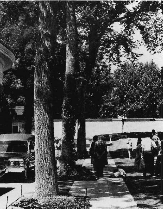Articles/Essays – Volume 07, No. 1
From Someone Who Did Not Know Him Well
Throughout my life images of Joseph Fielding Smith come and go, connected somehow with that of my grandfather who, stern before I was born, gradually mellowed until he ended up raising a grandchild with a permissiveness his own children never knew. I see President Smith at the pulpit in our ward, stern, humorless, as near to fire and brimstone as my pleasant childhood could show. I used to search my soul, fancying that he could see into it. Were there cobwebs in there—or worse—grimy spiders? I heard that President Smith never read the funnies on Sunday, and although avid about flying, had predicted man would never make it to the moon. For women he was in favor of skirts “that brush the ground” and was adamantly opposed to bathing suits in (on?) any form. It seemed to me that no one had ever seen him smile.
In college President Smith was a frequent visitor to the Institute of Religion, and when his wife, Jesse Evans, sang at our proceedings, she usually asked him to join her at the piano. I noted that his voice wasn’t bad, and that SHE could make him smile, even laugh.
His “Answers to Gospel Questions” never admitted of doubts or rumblings, and there had been some in my adolescent heart. So it was with fear and trembling that after finally graduating and applying for work at B.Y.U., I was interviewed by President Smith.
He didn’t smile; he wasn’t friendly. Fixing me with a gimlet eye, he said, “Have you ever doubted?”
I wanted to say, “What? Ever doubted what?” but I was frightened. I finally said, “Yes, I have. It’s hard to think and not to doubt once in a while.” I held my breath, but he only nodded and went on.
After that I began to hear about his sense of humor. A relative who had traveled with him reported his fondness for certain earthy jokes; someone else said he had been overheard to say he “didn’t care a snap about Missouri.” I met him one day in the Church archives where he presented me with some valuable old pamplets, and was warm and lighthearted about it. Someone else said he thought it too bad that we of the general membership cannot know our leaders better instead of projecting our own fears and fantasies upon them. I suppose that in a way we do create the personalities of leaders, refusing to allow laughter or banter. I think of Jesse Evans, full of songs and jokes, but steely just the same, surely a liberated personality. President Smith’s choosing her and loving her (with great grief at her departure) must reveal something of the security of his own inner spaces.
As for laughter, Mormons seem ready to laugh at themselves in small groups, but seem terribly afraid of letting the vulnerability of laughter provoke the public or the press. Perhaps our leaders could be more open with us if we could become more comfortable with ourselves.
On the other hand, forty years in the world show me that smiles are cheap enough (have they not been painted on every souvenir in the world?). Do we not have need of the fortitude, even the stern survival techniques of the pioneers? On balance, I am glad that President Smith not only represented those virtues, but was there in my childhood to cause me to look inward.
When President Smith finally ascended to the Presidency, I was struck with pictures of his early manhood, with the resemblance to our first prophet, especially in the sensitive mouth, the beautiful eyes. And listening to his first conference address, I found him kindly, gracious, and speaking eloquently of brotherhood as if he knew the whole world was listening and would heed.
He was extreme, I used to say. Now I say, I think he was extreme in his devotion to his faith, extreme in his love of the scriptures, never in sympathy with splinter groups that sought to splinter the Church, never taken in by periphery interests, never taken with wild surmise.
His was a private personality that came gradually to stand for the retreat of fear and the embrace of love.


 Back to full Issue
Back to full Issue

